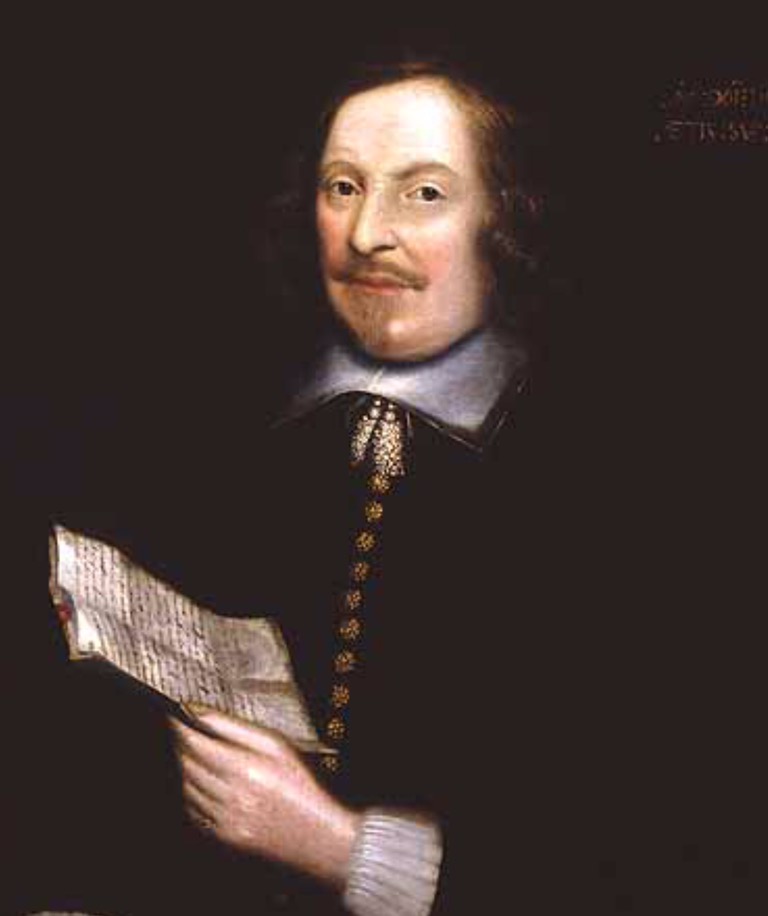The Pilgrim Edward Winslow wrote the only contemporaneous account of the first Thanksgiving at Plymouth in late 1621. Fifty of the original 100 settlers had survived the first year in Massachusetts, and they were joined in celebration by 90 friendly Indians. The four surviving adult Pilgrim women did the cooking! Winslow was a young printer who had helped Pilgrim leader William Brewster publish subversive religious and political tracts against King James I and the Church of England while hiding in England and in Dutch exile. Aboard the Mayflower off the shore of Massachusetts in 1620 he had signed the Mayflower Compact, the first governing document of New England. After his young wife died in the brutal first year of 1621, he married a widow in what was the first Pilgrim wedding in the new colony. His second wife, Susannah, had by her first husband given birth on board the Mayflower to the first Pilgrim baby of the New World, who became Winslow’s stepson and lived until 1704, the last Pilgrim survivor. Winslow in the 1630s became governor, conducting diplomacy with the Indians and neighboring colonies, and later still returned to England to help in the parliamentary led war with King Charles I. In service to the new Puritan regime as a diplomatic commissioner he died on a British naval expedition against the Spanish in the Caribbean in 1655, about age 60, reportedly buried at sea. A painting of Winslow is the only surviving portrait of any original Pilgrim and any witness to the first Thanksgiving.
Here’s Winslow’s December 11, 1621 description of the first Thanksgiving in a letter to a friend:
Loving, and old Friend; although I received no letter from you by this ship, yet forasmuch as I know you expect the performance of my promise, which was, to write unto you truly and faithfully of all things. I have therefore at this time sent unto you accordingly. Referring you for further satisfaction to our more large relations. You shall understand, that in this little time, that a few of us have been here, we have built seven dwelling-houses, and four for the use of the plantation, and have made preparation for divers others. We set the last spring some twenty acres of Indian corn, and sowed some six acres of barley and peas, and according to the manner of the Indians, we manured our ground with herrings or rather shads, which we have in great abundance, and take with great ease at our doors. Our corn did prove well, and God be praised, we had a good increase of Indian corn, and our barley indifferent good, but our peas not worth the gathering, for we feared they were too late sown, they came up very well, and blossomed, but the sun parched them in the blossom; our harvest being gotten in, our governor sent four men on fowling, that so we might after a more special manner rejoice together, after we had gathered the fruit of our labors; they four in one day killed as much fowl, as with a little help beside, served the company almost a week, at which time amongst other recreations, we exercised our arms, many of the Indians coming amongst us, and among the rest their greatest King Massasoit, with some ninety men, whom for three days we entertained and feasted, and they went out and killed five deer, which they brought to the plantation and bestowed on our governor, and upon the captain, and others. And although it be not always so plentiful, as it was at this time with us, yet by the goodness of God, we are so far from want, that we often wish you partakers of our plenty.
Winslow’s conclusion is lovely. He’s barely survived great horrors, his first wife and half his colleagues had died only months before, yet still he celebrates God’s goodness and wishes plenty for others. His remaining years would be productive and full of service, whose labors built a great civilization, from which the whole world benefits. May we all share in his spirit of sacrifice and Thanksgiving.
No comments yet




